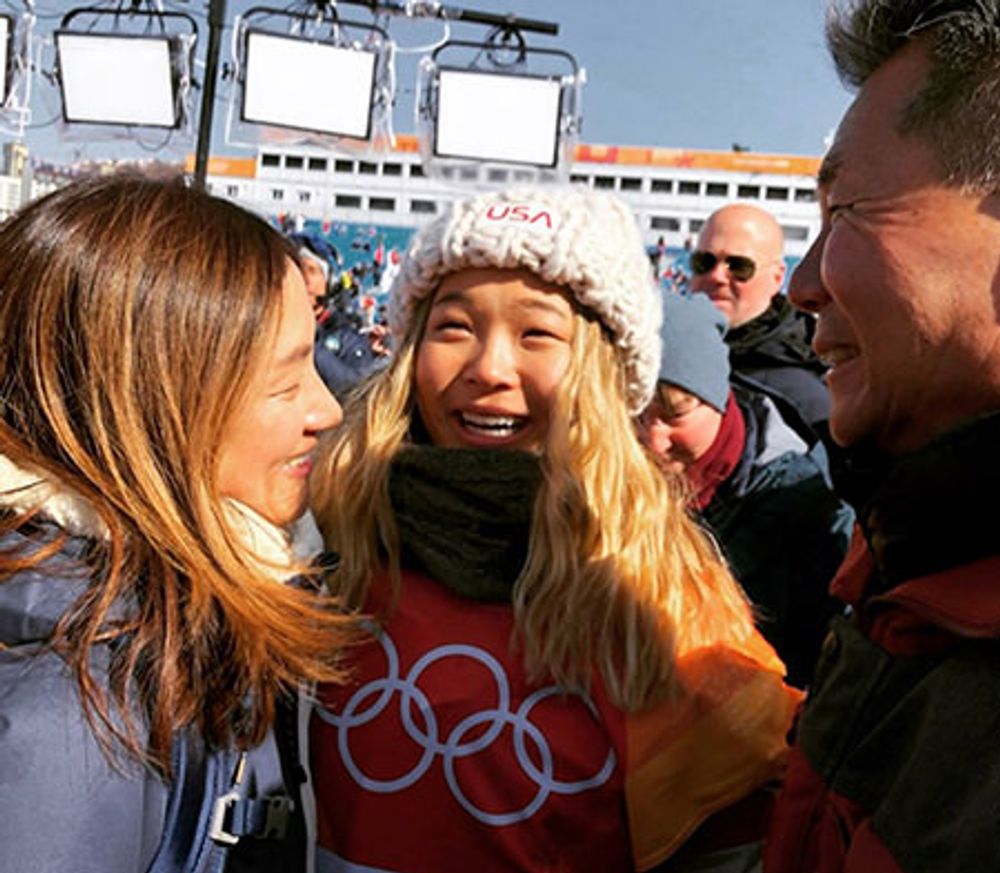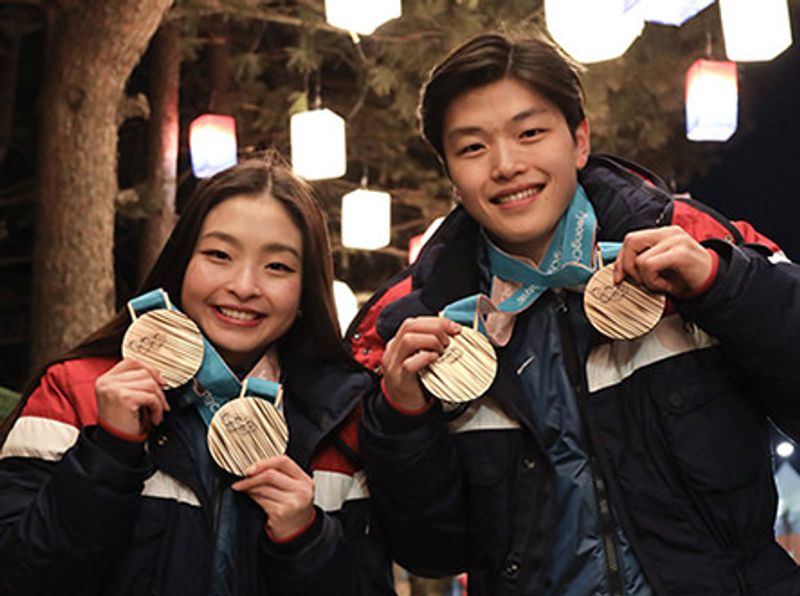Blog
Almost an Asian American Winter Olympics, but no medal for NBC

I wish I could have hung on to the Chloe Kim snowboarding victory and let it last the entire two weeks.
This was supposed to be an Asian American Winter Olympics in Asia, especially the way NBC was pushing both Kim and men’s figure skater Nathan Chen.
We know about the Asian American Olympians of the past from Kristi Yamaguchi and Michelle Kwan. Asian American women are hell on blades.
But would these be the games where Nathan Chen creates a new Asian American male stereotype? Would we be transported from the one-inch punching Bruce Lee to the new King of Quads in a Vera Wang costume (one that doesn’t malfunction)?
Perhaps in 2022. Not quite this time.
After Kim’s scintillating snowboard run that lasted less than a minute, Chen took the spotlight and stumbled in the team competition. He helped to win Bronze there, but that was well short of the goal.
The graceless tumbling continued for the women skaters. Though Mirai Nagasu nailed an historic opening triple axel and was lauded in the team skate, she struggled in the individual skates along with teammate Karen Chen and bottomed out the top ten.
Nathan Chen tried to rally with a tremendous quad performance in his individual long skate, but it wasn’t enough to medal.
After Kim’s smashing start, we only had the ice dancing Shibutanis’ Bronze in ice dancing to cheer.
And what a coincidence: Alex and Maia medaled and took their star turn around the same time as the 76th anniversary of Executive Order 9066.
Asian Americans of Japanese descent weren’t foreigners then or now.
At these games, here were the #ShibSibs representing all of America.

Of course, they were third best at these games. But with the America-centric coverage, it was hard to tell. The ShibSibs tended to get more air time on NBC than the Gold medalists Virtue and Moir of Canada. (But hey, they have better health care; they will survive).
But I found how you really couldn’t tell a person’s nationality or ethnicity at these games without a score card, passport, or blood test.
That’s for certain when it came to drugs. The official name for Putin’s team was The Olympic Athletes of Russia. I added an N.O.D., for “Not on Drugs.” It was quite a statement at the games–especially when a Russian curler was disqualified for testing positive during the competition itself.
Watching them throughout, they could have easily been Russian immigrants to the U.S. They were mostly all white. In these Olympics, you could be an American with dual citizenship and race for the country of your family’s heritage.
American Filipinos Asa Miller, a 17-year-old skier from Oregon, downhill skied for the Philippines team and finished 70th.
His teammate was Los Angeles-based Michael Christian Martinez, who finished 28th in the men’s individual figure skating competition.
I kept wondering why Philippine President Rodrigo Duterte couldn’t place himself on the Philippine team in the Biathlon, considering his renowned shooting skills. Just try to stop him.
The loosened rules, especially those allowing dual citizens through birth and immigration to compete, were actually a refreshing thing about these games.
Americans competing on other countries’ teams? You mean like Trump not acting on Russian meddling in our elections as if he’s on Team Russia?
Can I get an “America First?”
For me, it’s these little things that will mark the 2018 Olympic games. Images of VP Mike Pence in close proximity to the sister of Kim Jong Un. The North Korean cheerleading squad. And the combined Korean team playing on the same hockey team.
The North Koreans got what they wanted out of these games. But who knows if its semi-soft diplomacy will thwart or hasten the start of a major war.
And then there was this little colonial act by NBC.
COLONIAL TONGUE
After Sunday’s closing ceremony, people will leave Pyeongchang, South Korea, and it will return to what it was called before it got Olympic ringed and played by NBC.
The city will be known once again by its pre-colonial pronunciation.
That would not be Pyeong-CHANG, but rather the correct Korean pronunciation “Pyeong-Chahng.”
As my fellow Asian American Journalists Association members put out in a video guide, it’s more “Ch-AHNG,” with a definite “AH,” sound, the kind you’d make to a doctor if you wanted him to correct your pronunciation.
Definitely, it’s not the hard sound “CHANG,” as in “you rang?”
For the last two weeks, we’ve been “chang”-ed to death, which is no big deal, unless you are concerned with the truth, accuracy, and authenticity. You know, the stuff journalists should care about.
Perhaps that’s not as bad as getting North and South Korea confused. One is the country that makes your smart TV and Android devices.
The other is the home of Trump’s “Little Rocket Man.”
But pronunciation is an entirely different matter, and it’s a big deal when it comes to a broadcast medium.
It’s like being in a concert and hearing the same bad note repeated over and over whenever people on NBC said exactly where they were—which, of course, was in a place no one in Korea, North or South, had ever heard of.
It was just a clinker. More than a display of ignorance. It was an insistence on the wrong pronunciation. An act of defiance.
It was back in November when Sports Business Journal first pointed out the inconsistency of NBC’s pronunciation, noting that host Matt Lauer could go from Pyeong-“chung” (Not enough “ah,” so just 85 percent correct) to Pyeong-“chang,” as in bang (positively incorrect), almost in the same breath.
Of course, that’s not what got Lauer fired.
The Business Journal‘s Ben Fisher asked NBC, which essentially showed how much it cared about accuracy.
Its view came down to this: Screw authenticity. To hell with truth, NBC bought the rights, and they can bastardize the games whatever way they want. Even mispronouncing the name of the Olympic site.
Mark Lazarus, chairman of NBC Broadcasting and Sports, said NBC’s official pronunciation was “chang” as in “bang” and that was that.
“It’s cleaner,” Lazarus told Fisher.
Cleaner. And wrong-er.
It’s not a matter of being PC. Pyeongchang isn’t even capitalized in the middle.
But this is what you get when the rights are bought and sold to the highest bidder. The Olympic spirit comes filtered through a colonial tongue that chang-bangs us relentlessly.
It couldn’t end soon enough.
You wouldn’t call a bronze the “brown medal,” would you?
And that gold of Chloe Kim’s wasn’t yellow.

Emil Guillermo is an independent journalist/commentator. Updates at www.amok.com. Follow Emil on Twitter, and like his Facebook page.
The views expressed in his blog do not necessarily represent AALDEF’s views or policies.
Read Emil's full bio →